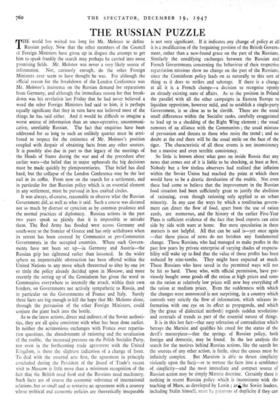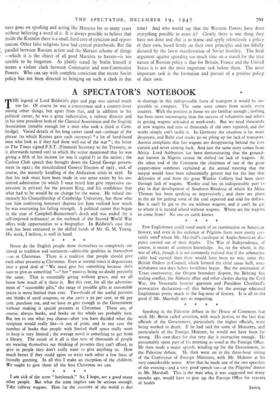THE RUSSIAN PUZZLE
HE world has waited too long for Mi. Molotov to define T Russian policy. Now that the other members of the Council of Foreign Ministers have given up in disgust the attempt to get him to speak frankly the search may perhaps be carried into more promising fields. Mr. Molotov was never a very likely source of information. Nor, curiously enough, do the other Foreign Ministers ever seem to have thought he was. For although the official reason for the breakdown of the London Conference was Mr. Molotov's insistence on the Russian demand for reparations from Germany, and although the immediate reason for that break- down was his revelation last Friday that he had never believed a word the other Foreign Ministers had said to him, it is perhaps equally significant that they in turn have not believed most of the things he has said either. And it would be difficult to imagine a worse source of information than an unco-operative, uncommuni- cative, unreliable Russian. The fact that enquiries have been addressed for so long to such an unlikely quarter must be attri- buted to respect for the eminence of Mr. Molotov's position coupled with despair of obtaining facts from any other sources. It is possibly also due in part to that legacy of the meetings of the Heads of States during the war and of the procedure after earlier wars—the belief that in major upheavals the big decisions must be made quickly by plenipotentiaries. That belief has died hard, but the collapse of the London Conference may be the last nail in its coffin. From now on the search for a settlement, and in particular for that Russian policy which is an essential element in any settlement, must be pursued in less exalted circles.
It was always, of.course, reasonable to observe what the Russian Government did, as well as what it said. Such a course was dictated not so much by distrust or cynicism as by common prudence and the normal practices of diplomacy. Russian actions in the past two years speak so plainly that it is impossible to mistake them. The Red Army has flooded west across Germany and south-west to the frontier of Greece and has only withdrawn when its retreat has been covered by Communist or pro-Communist Governments in the occupied countries. Where such Govern- ments have not been set up—in Germany and Austria—the Russian grip has tightened rather than loosened. In the wider sphere an impenetrable obstruction has been offered within the United Nations to any move which threatened to alter by one jot or tittle the policy already decided upon in Moscow, and more recently the setting up of the Cominform has given the word to Communists everywhere to intensify the attack, within their own borders, on Governments not actively sympathetic to Russia, and in particular on the Governments of France and Italy. Surely these facts are big enough to kill the hope that Mr. Molotov alone, through the persuasion of the other Foreign Ministers, could conjure the giant back into the bottle.
As to the latest actions, direct and indirect, of the Soviet authori- ties, they are all quite consistent with what has been done earlier. In neither the acrimonious exchanges with France over repatria- tion questions, the abandonment of rationing and the revaluation of the rouble, the increased pressure on the Polish Socialist Party, nor even in the forthcoming trade agreement with the United Kingdom, is there the slightest indication of a change of front. To deal with the external acts first, the agreement in principle concluded during the President of the Board of Trade's recent visit to Moscow is little more than a minimum recognition of the fact that the British need food and the Russians need machinery. Such facts are of course the economic substance of international relations, but so small and so tentative an agreement with a country whose political and economic policies are theoretically inseparable is not very significant. If it indicates any change of policy at all it is a modification of the bargaining position of the British Govern- ment, rather than a new-found grace on the part of the Russians. Similarly the unedifying exchanges between the Russian and French Governments concerning the behaviour of their respective repatriation missions show no change on the part of the Russians, since the Cominform policy leads on as naturally to this sort of thing as it does to strikes and sabotage. If there is a change at all it is a French change—a decision to recognise openly an already existing state of affairs. As to the position in Poland the parallel with all the other campaigns in Eastern Europe to liquidate opposition, however mild, and to establish a single-party Government, is so close as to be slavith. There are the usual small differences within the Socialist ranks, carefully exaggerated to lead up to a shedding of the Right Wing element ; the usual rumours of an alliance with the Communists ; the usual mixture of persuasion and threats to those who resist the trend ; and no doubt at the end there will be the usual smile on the face of the tiger. The characteristic of all these events is not inconsistency but a massive and even terrible consistency.
So little is known about what goes on inside Russia that any news that comes out of it is liable to be shocking, at least at first. Nobody but a feiv tireless observers had realised that inflation within the Soviet Union had reached the point at which there would have to be a drastic devaluation of the rouble. Not even these had come to believe that the improvement in the Russian food situation had been sufficiently great to justify the abolition of rationing, even though rationing only applied to an urban minority. In any case the ways by which a totalitarian govern- ment can direct the flow of food, apart from the use of ration cards, are numerous, and the history of the earlier Five-Year Plans is sufficient evidence of the fact that food exports can exist side by side with want at home. But mere speculation in these matters is not helpful. All that can be said is—yet once again —that these pieces of news do not betoken any fundamental change. Those Russians who had managed to make profits in the past few years by private enterprise of varying shades of respecta- bility will wake up to find that the value of those profits has been reduced by nine-tenths. They might have expected a§ much. Those Russians who have saved in the permitted ways will not be hit so hard. Those who, with official permission, have pre- viously bought some goods off the ration at high prices and some on the ration at relatively low prices will now buy everything off the ration at medium prices. Even the suddenness with which the changes were announced is not surprising, in a country which controls very strictly the flow of information, which releases in- formation with one eye on its effect as propaganda, and which (by the grace of dialectical methods) regards sudden revolutions and reversals of trends as part of the essential nature of things.
It is in this last fact—that easy toleration of contradiction which betrays the Marxist and qualifies his creed for the status of the devil's masterpiece—that the springs of Russian policy, both foreign and domestic, may be found. In the last analysis the search for the motives behind Russian actions, like the search for the sources of any other action, is futile, since the causes must be infinitely complex. But Marxism is able to thrust simplicity violently upon the facts—or to torture the facts into a semblance of simplicity—and the most immediate and compact source of Russian action may be simply Marxist doctrine. Certainly there is nothing in recent Russian policy which is inconsistent with the teaching of Marx, as developed by Lenin ; ar4 the Soviet leaders, including Stalin himself, must be paragons of duplicity if they can have gone on speaking and acting like Marxists for so many years without believing a word of it. It is always possible to believe that inside the Kremlin there is a small, hard core of cynicism and oppor- tunism. Other false religions have had cynical priesthoods. But the parallel between Russian action and the Marxist scheme of things —which it is the object of all good Marxists to hasten—is too terrible to be forgotten. As plainly stated by Stalin himself it means a violent clash between Communist and non-Communist Powers. Who can say with complete conviction that recent Soviet policy has not been directed to bringing on such a clash in due time? And who would say that the Western Powers have done everything possible to avert it? Clearly there is one thing they have not done and that is to frame and apply relentlessly a policy of their own, based firmly on their own principles and not fitfully dictated by the latest manifestation of Soviet hostility. The final argument against spending too much time on a search for the true nature of Russian policy is that for Britain, France and the United States it is not the most important task before them. The most important task is the formation and pursuit of a positive policy of their own.



































 Previous page
Previous page